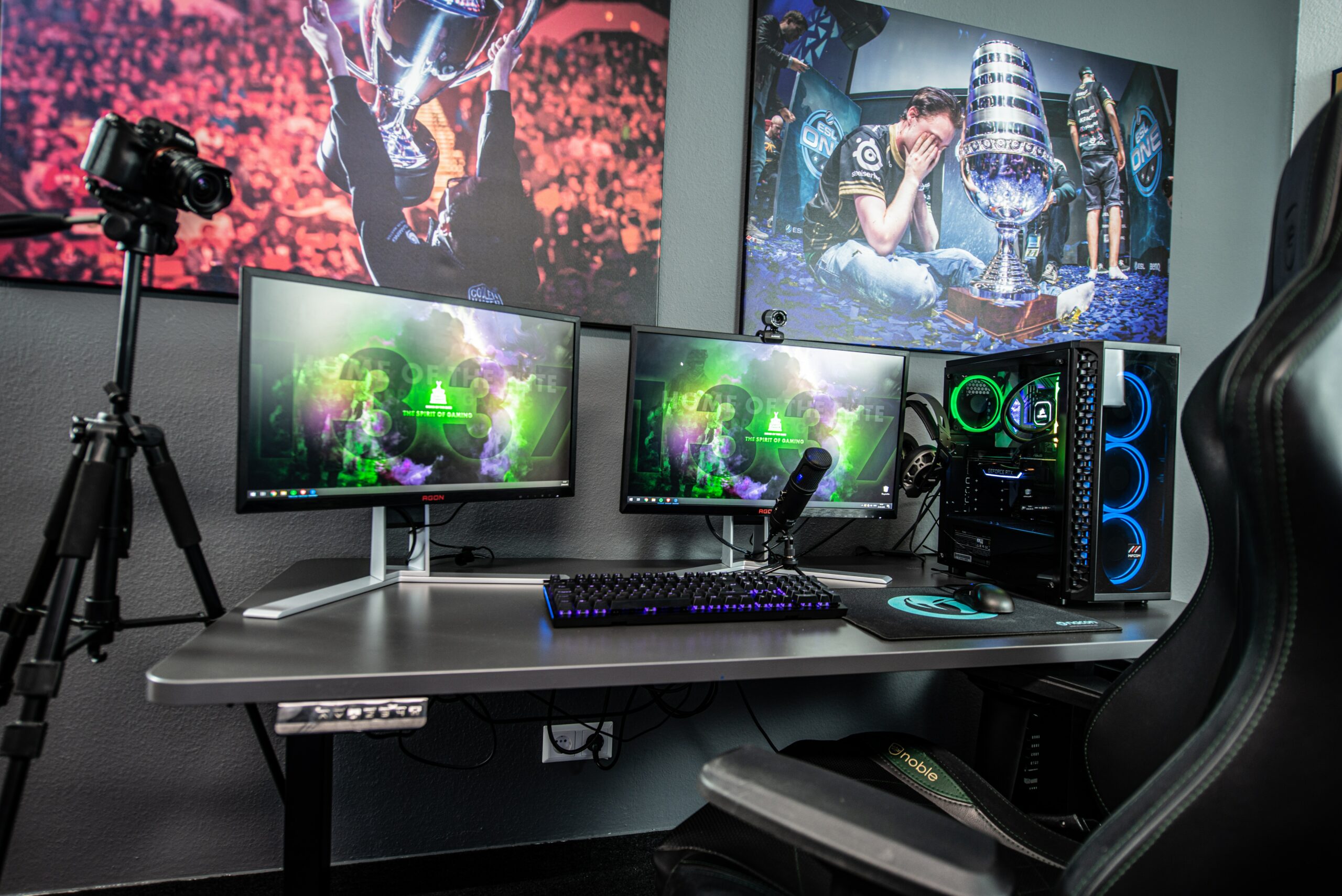
In this article, we’re going to take a deep dive into the world of gaming consoles and evaluate why they cost less than traditional desktop computers–soup to nuts.
Consoles are very different from the average PC: they don’t run on traditional operating systems, such as macOS or standard versions of Windows. Besides that, they have very limited functionality compared to a desktop or laptop.
When answering this question–why are consoles cheaper than PCs–, there is a little bit more under the surface than just the price of the console itself and the accessories that come with it–let’s take a peek.
But first, if you are looking for a shortened answer, we’ll just give you this: it depends.
Annoying, right?
What is the Average Cost of a Console?
If we are taking a peek at the latest and greatest generation of gaming console hardware, then we’d naturally be looking at the Playstation 5 and the Xbox Series X.
Each of the two comes with a couple of options: the base model and a ‘digital version.’ Both the Playstation and the Xbox offer this version of their newest model.
The Playstation 5 base model comes with a Bluray reader, which can be omitted in the Playstation 5 Digital version, which does not have this feature. The same can be said for the Xbox Series X base model, which also features a Bluray port, and also sports a lighter variant similarly titled the Xbox X Digital for the same reason–an omission of the Bluray drive.
The majority of users purchase and download their games digitally across the board, so this might not seem like much of a tradeoff for some. Instead, it might actually seem like a benefit, considering that the MSRP of the ‘digital’ models of both the Playstation and the Xbox comes in at a value-based price of $399.99, whereas both ‘base’ models come in at $499.99.
Consumers who plan on watching HDR content via Bluray may be disappointed that this feature comes only on the more expensive model. However, the amount of hefty specifications and features that you get for the base model’s price is very much so worth that extra hundred dollars.
YOU MAY ALSO LIKE: How Much Do Pro Gamers Make?
How About the Average Cost of a Gaming PC?
The average cost of a custom-built gaming PC is…well, up to you.
That answer might not satisfy you, but you have to remember that custom-built gaming PCs are exactly that–custom! Enthusiasts who choose to follow the route of building their own computer will find that, upon researching the market and the subsequent hardware it offers, graphics cards and processors, among many other computer components, are available at a wide range of prices.
If you want the newest Intel i9 processor, be prepared to shell out the same price you’d pay for an entire console. If you want something reasonably priced and quite suitable for 1440p gaming, a Ryzen 3600 processor can be found for less than $200.00 USD. It all depends on what your goal is.
With that being said, the average price that a custom-built gaming PC will run you is in the $800-$1200 range, but you can spend $400 or less just as easily as you could spend $5,000 or more. This is why it is difficult to put a specific label on the average price for a custom setup because the components you choose to put into it are entirely dependent on your budget and what you want to do with the machine.
RELATED ARTICLE: Best Gaming Setups
Are Consoles Really Cheaper?

Remember how we said that the average price of a gaming console is more than just the price of the device itself? We weren’t kidding.
You see, video games can cost a heck of a lot cheaper on PC platforms than on console platforms. This is due to the business model and strategy, first developed by the founder of Gillette razors, that is employed by Microsoft and Playstation alike. We’ll get into this later, so sit tight.
For now, though, most AAA games on both platforms will start at the base price of $59.99, with additional addons and versions (deluxe versions, extra downloadable content, ‘silver’ edition, etc.) raising the price to upwards of $100.
On PC, AAA titles will also debut with the same price–but over time, platforms such as Steam, Origin, and G2A, amongst many others, offer sales and cheaper ways to get the exact same edition of the game in question.
The species-making difference between the way that PCs and consoles operate is that, besides the games being generally more expensive on consoles, you also have to pay a monthly subscription fee just to be allowed access to multiplayer functionality.
This can be a huge dealbreaker for a lot of consumers who just want to play games with their friends, as a recurring monthly or yearly charge can be a psychological turnoff.
Another example is this–if you want the Playstation branded headset as well as an extra controller in case one of them breaks or the battery is drained mid-session, both will run you an additional $59.99 a-piece.
Take the price of the base model Playstation 5 with an extra controller, the name-brand headset, a years-subscription of Playstation Plus, as well as the above-average price of six AAA games (both new and dated). You’ll find that the overall cost of owning one comes to $1040–or some number quite close to that, as that does not explicitly take local taxes into consideration.
Seeing as you can put together a value-based gaming computer with a handful of AAA games for as low as $600, the common notion that ‘gaming consoles are way cheaper’ simply doesn’t sit with the numbers.
This is also backed by a recent DFC Intelligence study, which claims that console users have the highest spending per user.
READ ALSO: Best Pink Gaming Headsets
So, How Are Manufacturers Able To Do This?
The business model that Playstation and Xbox employ is very different than that of the companies that manufacture PC components, make laptops, and sell pre-built systems.
It started with Gillette razor company back in 1908, where they designed the main product, the razor, and sold it at a profit loss–meaning it was more expensive to make than the money they got for selling it was worth–but made their money off of selling the blades. Give away the handle, sell the sharp stuff that goes in it.
By creating and selling a device that generates no profit on its own, yet selling products that are required to make use of the device–this being digital or hard copies of games–companies like Microsoft and Playstation are able to capitalize on a very lucrative market.
Because gaming consoles tend to have a long shelf life, such as the Playstation 4 that had a respectable 5-year run, the ever-growing market of video games constantly being produced creates a ‘spring of youth’ niche that console developers can continue to make use of. You only need to buy one console, but the number of video games you can buy only continues to increase.
In addition to generally selling a lot of games on a consistent basis, this business model proves especially useful when developers release console-exclusive videogames–games that can only be purchased, downloaded and played on one console–or when repeating titles come out every year. Some examples of those would be sports titles such as FIFA, NBA2K, and MLB The Show.

RELATED READING: Best Audiophile Headphones for Gaming
How Do Microsoft and Playstation Make Profit?
While this business model might seem confusing at first, you have to remember that the number of video games and other devices such as controllers and headsets far excels the number of consoles sold.
Take a peek at your game library, for instance–say you’ve purchased 18 games over two years while also having purchased six individual months of Playstation Plus the first year and a full years-worth for the second.
What does this tell us? It tells us that you’ve spent $400 on a console, but roughly $1200 on games and multiplayer subscription packages.
Microsoft and Playstation are able to make their profits off of the continuous and steady sale of games and other applications sold on their proprietary store that far exceeds the profit returned, if any whatsoever, from selling the device itself.
Additionally, many Playstation and Xbox fans are returning customers when new devices are launched, which is why the Xbox Series X and the Playstation 5 are still hard to get your hands on.
By building hype and introducing new features such as Bluray and HDR compatibility, movies and other media consumables are being purchased directly from the two companies’ proprietary stores, which has now only added another profit avenue.
Lastly, Microsoft and Playstation are able to eat up this negative profit margin because of how the consoles themselves are made. It costs less to mass-produce proprietary hardware that is specifically designed to work in a certain system, form factor, and optimized for a singular OS.
Meanwhile, makers of individual desktop components have to spend additional time, money, and research on making their products widely usable in a variety of operating systems, case formats, and hardware configurations.
Which Has Better Value–Gaming PCs or Consoles?
Now, here’s where it gets dicey.
Since PC gaming and console gaming began their ever-continuing peak, there has been a lot of discussion between the two parties about which is superior–one side saying this, one side saying another.
The main subject of the debate comes down to which offers the better value–something that can really only be decided by each individual and what each consumer uses their device for.
Seeing as you can build a custom-built gaming PC for just about whatever price you desire as well as purchase videogames that mold well to the chosen specifications of your PC, the question of which one has the better value seems to be indeterminate…
…until you remember that one is a console with a limited OS that relies upon consumers using it for gaming-heavy workloads and not direct media consumption, and the other is a full-blown desktop with just as many features and usability as any other full-OS device on the market.
YOU MAY ALSO LIKE: Best Mobile Hotspots for Gaming
What About The Usability Experience?
Owning a desktop PC that can run games just as well (if not better) than consoles while paying a lesser or even comparable price is a pretty obvious winner. You can also browse the web, consume any kind of media available, edit and produce video content, write emails, and the like–everything that you would assume you’d be able to do on a computer.
You can even give yourself a console experience if you grab an aftermarket gaming controller and set up your desktop to be played from the couch with third-party software such as SteamOS and the like.
At the end of the day, we can only honestly say that it comes down to the user experience desired by each consumer, as no person is the same!
Some people will purchase consoles because many of their friends play their games on the same platform, so it makes sense to join in on the fun, too. Other customers want a streamlined and portable experience only found in a console, which is also respectable.
On the other hand, the majority of gamers who play on PC also use their desktops as their daily drivers for other activities, as we mentioned previously. Having a powerful and versatile machine is useful when you want to do more than just play video games, especially if you are a user who wants a clean and slick experience.

In Conclusion
All in all, consoles can be cheaper than gaming desktops, but that depends on the budget that you allocate for them. As to the question of which platform offers more value, that depends on what you intend to use it for!
There is no wrong way to go–nowadays, computer components and consoles alike are so technologically advanced, powerful, and feature-packed that whichever choice you make is the right choice.
RELATED ARTICLE: How to Improve Your Tracking Aim In FPS Games

Be the first to comment